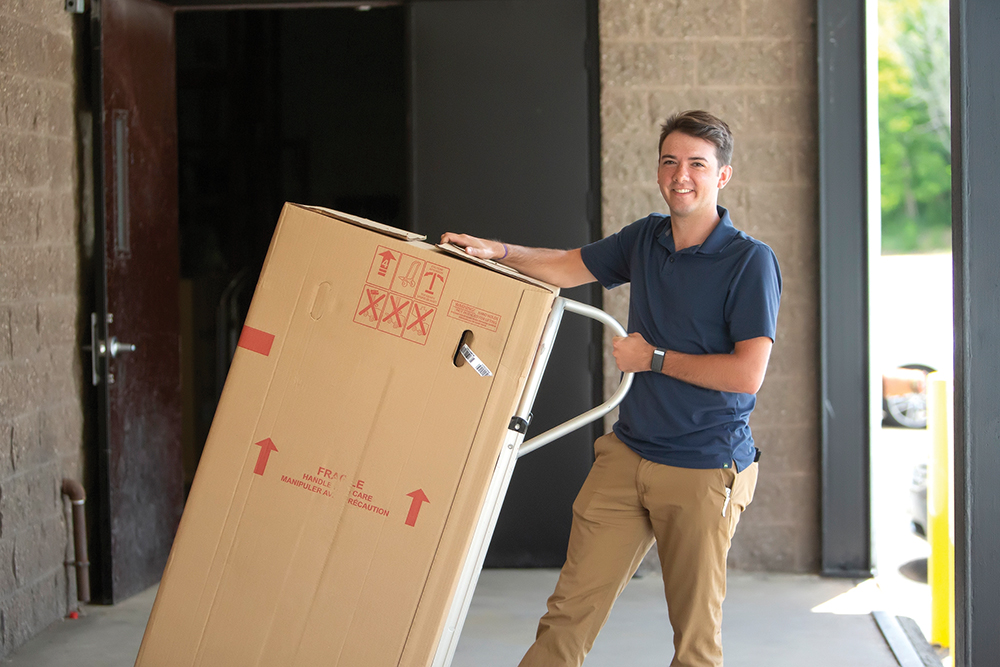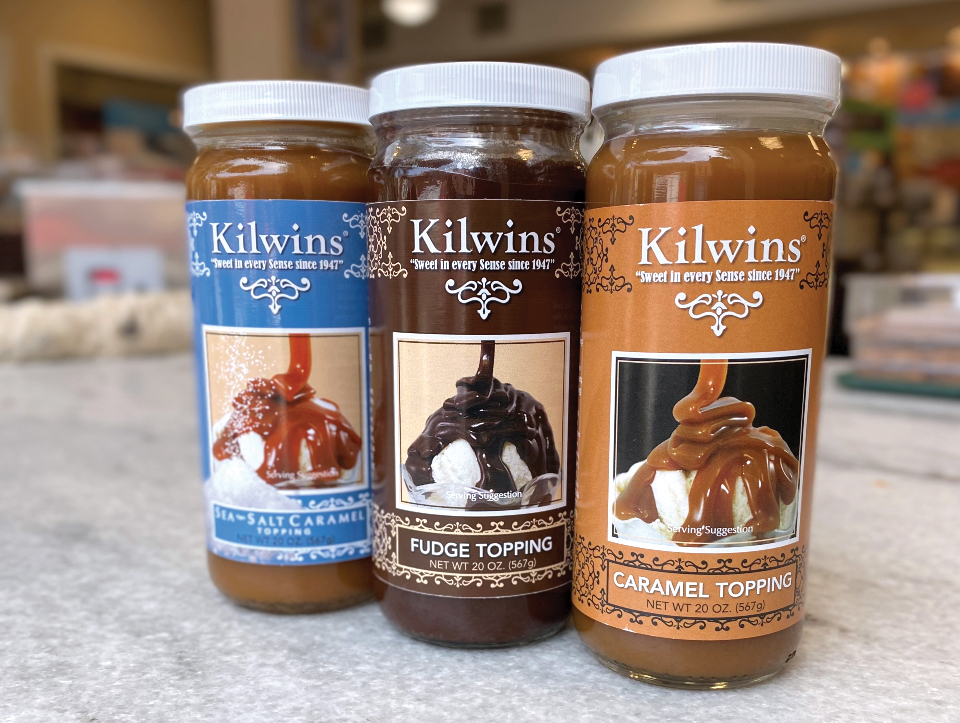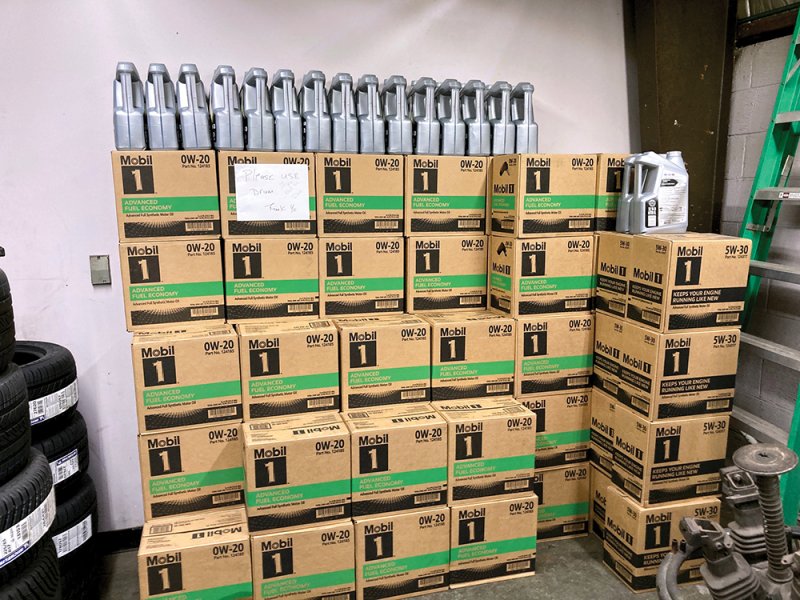 An employee on the loading dock at The Granite Group. Courtesy photo.
An employee on the loading dock at The Granite Group. Courtesy photo.
For retailers who successfully navigated the closures and pandemic-driven business restrictions of 2020, the road is not a smooth one yet, as lingering manufacturing backlogs and raw materials shortages continue to hit the supply chain.
From small items, such as packaging, to major components and computer chips, retailers have to move delivery dates from weeks to months and tell customers that some things just won’t be available.
“It’s affecting just about every retailer,” says Nancy Kyle, president of the NH Retail Association. “There is no rhyme or reason. Some of it dates back to when factories were shut down at the beginning of the pandemic and weren’t
making things.”
Janette Desmond, the owner of Kilwins in Portsmouth, says at first, she couldn’t get covers for the hot fudge she makes and sells, and soon the shortages were popping up all over the store. “We make our own ice cream and can’t get fruit. It is not because there isn’t any growing, it is because they have no one to pick it. Fruit is rotting in the fields. That is our biggest problem, getting ingredients.”
 Kilwins in Portsmouth experienced difficulty procuring covers for its hot fudge jars. Courtesy photo.
Kilwins in Portsmouth experienced difficulty procuring covers for its hot fudge jars. Courtesy photo.
Desmond carries a handful of candy brands and the product lines are shrinking as manufacturers discontinue items because they can no longer make hundreds of flavors or styles, she says.
Disruptions have been uneven and unpredictable, says Bill Condron, president and CEO of The Granite Group in Concord. The company distributes plumbing, heating, cooling, water and propane supplies through 45 wholesale branches and also operates 15 retail showrooms under The Ultimate Bath Store name.
“A few things happened all at once when the pandemic hit,” he says. “People pulled back [on renovations] then the demand returned, furiously. In about June of 2020, it went from, ‘don’t come into my house’ to ‘when can you get here?’ for our customers.”
Condron says while COVID protocols and shutdowns disrupted factory production, it seemed like that flow would recover and return to normal levels, until an ice storm in Texas and hurricanes changed that trajectory. “Mother nature dealt us another big blow,” says Condron. “These Texas storms knocked out petrochemical production, which affects resin, and that’s in a lot of products that we distribute. Now there’s labor, as you try to meet demand you struggle to fill shifts. All blended together, the supply chain is uneven and unpredictable. It’s like whack-a-mole, impacting one product then another.”
For Dave Dupont, owner of Dupont’s Service Center in Dover, the thousands of parts needed to repair cars come with thousands of reasons they can’t be found. “There are a variety of reasons people are giving us for the shortages and lack of delivery,” he says. “It’s a fairly broad range of things you use in a car.”
He says there are significant parts shortages with OEM (original equipment manufacturers). “BMW used to be able to tell us within the hour when we would get the part. The attitude now is, ‘you will get it when you get it,’” he says. “A lot depends on where the warehouse is. Some manufacturers are better off than others, but we have ship dates on some out-of-stock parts of six to eight weeks.”
An oil shortage is challenging as well. “At first, there was a problem getting the caps for the quarts of oil, then a lack of warehouse workers, drivers, and now a lack of product,” says Dupont. He says motor oil, a staple of his business, used to come in by the truckload, and certain high-end grades came in drums. “We went from 55-gallon containers to smaller bottles, to whatever they could give us. I’ve got case lots of Mobil1 stacked up out in the back. We will take what we can get and hope we get it at a fair price,” Dupont says.
 Cases of motor oil at Dupont’s Service Center. Courtesy photo.
Cases of motor oil at Dupont’s Service Center. Courtesy photo.
David Lurie, the owner of Plymouth Furniture Company, says he has supply chain issues every single day from the moment he opens the door in the morning. “The biggest challenge is that furniture manufacturers can’t get foam to make the cushions. What used to be a six- to eight-week turnaround is now seven to 10 months. The foam shortage also impacts mattresses and floor padding. It almost makes you not want to be in the retail business,” he says.
Lurie says the easiest way to describe the supply chain challenges to customers is that “in business today you can’t sell out of an empty cart and that is what a lot of retailers are trying to do,” he says. “But I still come to work every day with a positive outlook. This is probably the most challenging thing in the nearly 100-year history of the business, but it is beyond our control.”
Another way the supply chain has been disrupted is through the cancellation of trade shows, which provide retailers with the chance to see the new items, place orders and even buy directly from the event.
Jude Dutille, owner of Dutille’s Jewelry Design Studio in Lebanon, says without the shows, he had to reach out to some of his regular vendors. “A few sent boxes of stuff to look at on approval. We would go through the shipment, pick out what we liked and send the balance back,” he says.
Dutille says some in the jewelry industry were worried when COVID-19 cases were soaring in India, as it would be a big hit as India is the manufacturing center of the lower- to medium-quality diamond supply. “People worried there might be a hiccup, but it didn’t materialize,” he says.
Service Over Supply
Retailers are recognizing that people are more understanding once they know the challenges and it helps to find creative ways to offer more with less. “We have been in business, the same family, for 98 years,” says Lurie. “A lady came into the store and said she didn’t think, since we have been around so long, that we would be impacted by these issues. But I am no different from anyone else.”
Lurie says he increased his inventory, “for instant gratification and that is what has given me the edge. The other thing that gives us an edge is that we do our own service. If you buy it from us, we come to the house and we fix it. We have tens of thousands of appliances in the field that we maintain for customers and this is why people come back to us. We are dealing with third- and fourth-generation families of customers.”
At Kilwins, Desmond has a menu board of ice cream flavors that people can read as they wait in line. “When they get to order, they are disappointed that their choice isn’t available,” she says. “But when you explain why, people are pretty understanding, and then they try something new, which can be kind of fun for them.”
Condron says, early on, customers would ask, “What do you mean I can’t get it? What do you mean it’s three months away?
What do you mean you can’t service me today?” Now, generally, people know the supply chain issues are real and are resetting their expectations. “Our people are stressed, no one wants to deliver an order that is only 80% or 90% complete.
Nine out of 10 isn’t good enough for our customers, so everyone is juggling to find a solution and doing a phenomenal job,” says Condron.
The New Normal
The question of when things might return to normal or a new normal comes up all the time, Condron says. “Last winter, we said if we can just get to the vaccine, and by the spring things will be better and, in some ways, it did. Shipping should be working itself out; if you believe the [federal reserve], inflation should mitigate and the component issues should work themselves out.”
But he adds that the pent-up energy and cash that are fueling consumer demand will also remain, along with the labor shortage. He says he is searching for good people to join his team every day, along with every contractor in the trades who tells him they could use 10 people.
“If you told me in 2020, the issue we were going to have would be shortages to meet demand, I’d say where do we sign. It was really scary back then,” Condron says. “Let’s keep these struggles in context.”
For Dutille of Dutille’s Jewelry Design Studio, it has also been exceptionally busy, despite the cancellation of weddings and other celebrations in 2020. “Most of what we do is to customer specifications, especially in the bridal,” says Dutille. “The millennials want something different and unique. While we have to push out due dates way longer than we ever had, month by month I am continually amazed by how busy it keeps getting.”
Desmond of Kilwins says she is having her best year ever in terms of customer count and sales. If it isn’t great beach weather, people vacationing on the coast come downtown to shop. Fall will draw even more tourists just as she is losing staff, with five heading off to college and a few more back to high school, but she says she will simply continue to adjust. “We are just constantly pivoting,” says Desmond. “Work on something else and make it work, we do that every day.”

 Current Issue - April 2024
Current Issue - April 2024